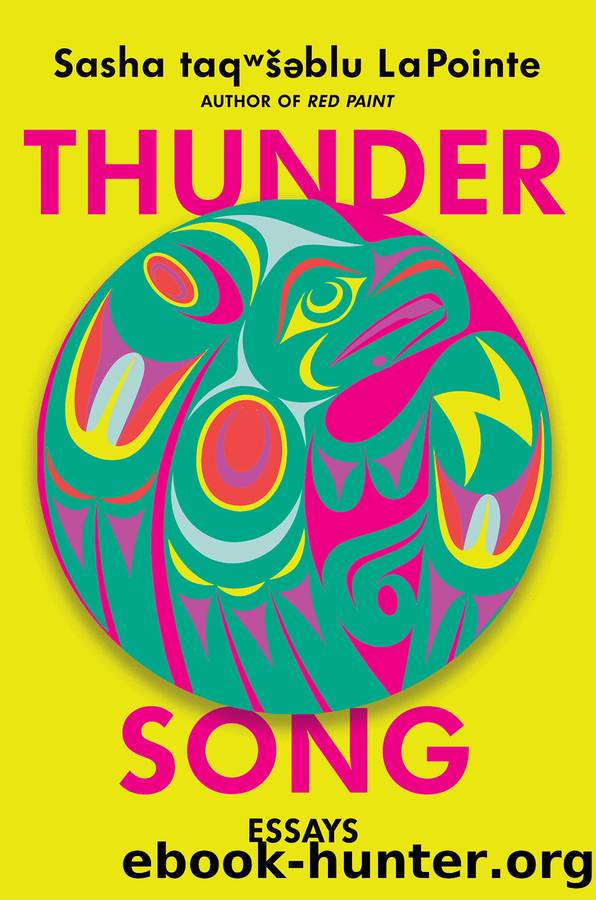Thunder Song: Essays by Sasha Lapointe

Author:Sasha Lapointe [Lapointe, Sasha]
Language: eng
Format: epub
Tags: Biography & Autobiography, Cultural; Ethnic & Regional, Indigenous, Social Science, Indigenous Studies, Popular Culture
ISBN: 9781640096356
Google: 6jfKEAAAQBAJ
Amazon: 1640096353
Publisher: Catapult
Published: 2024-03-04T22:00:00+00:00
The first time I recognized commodity foods on television I was watching Roseanne with my white roommates. It was late. A band was sleeping over and we all huddled on the couch in my communal house in Seattle, sharing vegan pizza and beer. On TV, Roseanne opened the cupboard and yanked out a white bag with big black lettering that read POTATO CHIPS, bold and simple. âOh my god,â I laughed and pointed. âLook, reservation Layâs!â My mouth fell open in a dumb smile. I looked around at my friends, waiting for their joined laughter, that sound of a roomful of people all getting the joke. But the group was silent. Eventually a friend chimed in to say something about television series not having the rights to name brands. Something about licensing and endorsements. Something about Pepsi. The conversation shifted, but I couldnât stop thinking about the black-and-white cans of food, the black-and-white boxes and bags. I had seen the same label, the same black lettering against a white backdrop, when I was growing up on the reservation. FRUIT COCKTAIL in black and white. ORANGE JUICE, SHREDDED CHICKEN, APPLESAUCE, and even just MEAT in a can in a cupboard with dozens of other identical cans in my friendâs house in the third grade. We had opened all the cans of peaches that day and eaten them in her driveway. That night I took some cultural inventory. None of my friends, my weirdo, disenfranchised, misfit, white punk friends, had ever seen a cupboard like that. I think of this every time one of my vegan friends examines a label, holds it close to their nose to read the long list of ingredients to determine whether the food in question meets their standards. This is a privilege. This is a luxury. I learned how to stay quiet. I learned how to stay hungry. I went to vegan grocery stores looking for what I craved. They had plant-based chicken, beef, and duck. They had every cheese imaginable made with cashews. But they never had salmon. The closest thing I ever found was a thin, unnaturally bright pink sheet of vegan lox. It was like a salmon-flavored fruit roll-up. It was awful. Still I spread it out on a bagel with vegan cream cheese, underwhelmed. I felt lonely as I ate it. I looked at its odd pink color and wondered how they made it. Itâs easy to accept that your diet has been colonized when you think youâve chosen it. In my teens and twenties, I convinced myself that if I somehow denied the part that made me Coast Salish, the part that made me Indian, I could be as carefree, radical, and punk as the people around me. That I could be more white. I didnât know how thoroughly being hungry would quiet me. I was quiet at dinner parties and on dates, at vegan potlucks and brunch outings. It always came back to âSee, you donât have to eat animals. Look at what theyâre doing with soy and tempeh.
Download
This site does not store any files on its server. We only index and link to content provided by other sites. Please contact the content providers to delete copyright contents if any and email us, we'll remove relevant links or contents immediately.
Down the Drain by Julia Fox(981)
The Light We Carry by Michelle Obama(900)
Cher by Cher(798)
Simple Passion by Annie Ernaux(747)
Love, Pamela by Pamela Anderson(603)
The Nazis Knew My Name by Magda Hellinger & Maya Lee(579)
Zen Under Fire by Marianne Elliott(565)
You're That Bitch by Bretman Rock(551)
Novelist as a Vocation by Haruki Murakami(543)
Alone Together: Sailing Solo to Hawaii and Beyond by Christian Williams(533)
The Foxfire Book of Appalachian Women by Kami Ahrens(531)
Kamala Harris by Chidanand Rajghatta(497)
Gambling Man by Lionel Barber(490)
The Barn by Wright Thompson(440)
Drinking Games by Sarah Levy(430)
A Renaissance of Our Own by Rachel E. Cargle(418)
Limitless by Mallory Weggemann(417)
A new method to evaluate the dose-effect relationship of a TCM formula Gegen Qinlian Decoction: âFocusâ mode of integrated biomarkers by unknow(416)
Memoirs of an Indian Woman by Shudha Mazumdar Geraldine Hancock Forbes(415)
